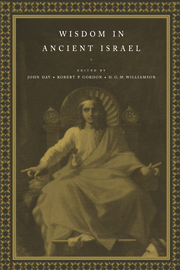Book contents
- Frontmatter
- Contents
- List of abbreviations
- Introduction
- Part 1 The ancient near eastern setting
- Part 2 Old Testament and Apocryphal texts
- 4 Foreign Semitic influence on the wisdom of Israel and its appropriation in the book of Proverbs
- 5 The limits of theodicy as a theme of the book of Job
- 6 Qoheleth
- 7 A house divided: wisdom in Old Testament narrative traditions
- 8 Wisdom in Solomonic historiography
- 9 Amos and wisdom
- 10 Hosea and the wisdom tradition: dependence and independence
- 11 Isaiah and the wise
- 12 Jeremiah and the wise
- 13 The wisdom psalms
- 14 Wisdom and Daniel
- 15 Ecclesiasticus: a tract for the times
- 16 The Christian use and the Jewish origins of the Wisdom of Solomon
- Part 3 Themes
- Biographical note: John Adney Emerton
- Bibliography of the works of John Adney Emerton
- Indexes
- Principal biblical and apocryphal references
5 - The limits of theodicy as a theme of the book of Job
Published online by Cambridge University Press: 16 October 2009
- Frontmatter
- Contents
- List of abbreviations
- Introduction
- Part 1 The ancient near eastern setting
- Part 2 Old Testament and Apocryphal texts
- 4 Foreign Semitic influence on the wisdom of Israel and its appropriation in the book of Proverbs
- 5 The limits of theodicy as a theme of the book of Job
- 6 Qoheleth
- 7 A house divided: wisdom in Old Testament narrative traditions
- 8 Wisdom in Solomonic historiography
- 9 Amos and wisdom
- 10 Hosea and the wisdom tradition: dependence and independence
- 11 Isaiah and the wise
- 12 Jeremiah and the wise
- 13 The wisdom psalms
- 14 Wisdom and Daniel
- 15 Ecclesiasticus: a tract for the times
- 16 The Christian use and the Jewish origins of the Wisdom of Solomon
- Part 3 Themes
- Biographical note: John Adney Emerton
- Bibliography of the works of John Adney Emerton
- Indexes
- Principal biblical and apocryphal references
Summary
Generally speaking, the Satan's question to God in i 9, ‘Does Job fear God for nought?’, is understood as being cynical, the implication of the question being that Job sees a direct relationship between his piety and his prosperity and therefore naturally cultivates his piety. But if the question is intended as cynical, it is certainly not dismissed as such by God in the narrative, but is taken with the utmost seriousness, and there is good reason for believing that its implication was nothing more than many in ancient Israel would have regarded not merely as unobjectionable but as fully warranted. The belief appears to have been widely current that there is indeed a direct relationship between ‘the fear of God’ and wellbeing, as an examination of the contexts of the expressions ‘fear of the Lord/fearing the Lord’ indicates. The ‘fear of the Lord’ is not only ‘the beginning of wisdom’ but has for its ‘reward’ ‘riches and honour and life’ (Prov. xxii 4); it ‘prolongs life’ (Prov. x 27) and anyone who has it ‘rests satisfied and will not be visited by harm’ (Prov. xix 23); ‘by the fear of the Lord one avoids evil’ (Prov. xvi 6) and ‘the snares of death’ (Prov. xiv 27); ‘those who fear him have no want’ (Ps. xxxiv 10); God's ‘abundant goodness’ is laid up for those who fear him (Ps. xxxi 20); they are delivered from death and kept alive in famine (Ps. xxxiii 19); ‘wealth and riches’ are in the house of those who fear the Lord, and their ‘descendants will be mighty in the land’ (Ps. cxii 2, 3).
- Type
- Chapter
- Information
- Wisdom in Ancient Israel , pp. 71 - 82Publisher: Cambridge University PressPrint publication year: 1995
- 1
- Cited by

